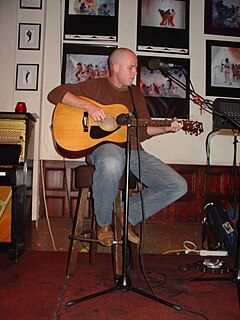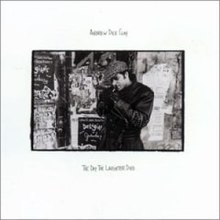
William Melvin Hicks was an American stand-up comedian, social critic, satirist, and musician. His material—encompassing a wide range of social issues including religion, politics, and philosophy—was controversial and often steeped in dark comedy.

Stand-up comedy is a comedic performance to a live audience in which the performer addresses the audience directly from the stage. The performer is known as a comedian, a comic or a stand-up.

Sir Kenneth Arthur Dodd was an English comedian, singer and occasional actor. He was described as "the last great music hall entertainer", and was primarily known for his live stand-up performances.

Rodney Dangerfield was an American stand-up comedian, actor, screenwriter, and producer. He was known for his self-deprecating one-liner humor, his catchphrase "I don't get no respect!" and his monologues on that theme.

A comedian or comic is a person who seeks to entertain an audience by making them laugh. This might be through jokes or amusing situations, or acting foolish, or employing prop comedy. A comedian who addresses an audience directly is called a stand-up comedian.

Rant in E-Minor is an album by stand-up comedian and satirist Bill Hicks. Both this album and a similar album of new material, Arizona Bay, were released posthumously by Rykodisc on February 25, 1997, marking three years since Hicks' death.

Neil Hamburger is a fictional standup comedian and singer created by Australian-American entertainer Gregg Turkington. Distinguished for his misanthropic jokes and anti-comedy style, Turkington has released a number of albums as Hamburger and has appeared as the character in various films, television shows, and other media. In 2015, the act inspired the feature-length film Entertainment, which stars Turkington as a "variant" of the character.

Andrew Dice Clay is an American stand-up comedian and actor. He rose to prominence in the late 1980s with a brash, deliberately offensive persona known as "The Diceman". In 1990, he became the first stand-up comedian to sell out Madison Square Garden for two consecutive nights. That same year, he played the lead role in the comedy-mystery film The Adventures of Ford Fairlane.

Samuel Burl Kinison was an American stand-up comedian and actor. A former Pentecostal preacher, he performed stand-up routines that were characterized by intense sudden tirades, punctuated with his distinctive scream, similar to charismatic preachers. Initially performing for free, Kinison became a regular fixture at The Comedy Store where he met and eventually befriended such comics as Robin Williams and Jim Carrey. Kinison's comedy was crass observational humor, especially towards women and dating, and his popularity grew quickly, earning him appearances on The Tonight Show Starring Johnny Carson, Late Night with David Letterman and Saturday Night Live. At the peak of his career, Kinison was killed in a car crash. Kinison received a Grammy nomination in 1988 for the single "Wild Thing" from his Have You Seen Me Lately? album, and a posthumous win in 1994 for Best Spoken Comedy Album, Live from Hell.
Comic timing emerges from a performer's joke delivery: they interact with an audience—intonation, rhythm, cadence, tempo, and pausing—to guide the audience's laughter, which then guides the comedic narrative. The pacing of the delivery of a joke can have a strong impact on its comedic effect, even altering its meaning; the same can also be true of more physical comedy such as slapstick. Comic timing is also crucial for comedic video editing to maximize the impact of a joke, for example, through a smash cut.

A heckler is a person who harasses and tries to disconcert others with questions, challenges, or gibes. Hecklers are often known to shout encouraging comments at a performance or event, or to interrupt set-piece speeches, with the intent of disturbing performers and/or participants.
Off-color humor is humor that deals with topics that may be considered to be in poor taste or vulgar. Many comedic genres may incorporate "off-color" elements.

An open mic or open mike is a live show at a venue such as a coffeehouse, nightclub, comedy club, strip club, or pub, usually taking place at night, in which audience members may perform on stage whether they are amateurs or professionals, often for the first time or to promote an upcoming performance. As the name suggests, performers are usually provided with a microphone plugged into a PA system so that they can be heard by the audience.

George Henry Wallace is an American comedian and actor.

The Aristocrats is a 2005 American documentary comedy film about the famous eponymous dirty joke. The film was conceived and produced by comedians Penn Jillette, Paul Provenza and Peter Adam Golden, and it was edited by Emery Emery. Distributed by THINKFilm, it is dedicated to Johnny Carson, as "The Aristocrats" was said to be his favorite joke.

Flying Saucer Tour Vol. 1 is a live performance album by American stand-up comedian and satirist Bill Hicks, released by Rykodisc in 2002. Unlike his other albums, where the crowds have generally been fairly receptive and accepting of his act, this album is notable for the negative reaction Hicks receives throughout most of the album.

Comedy is a genre of fiction that consists of discourses or works intended to be humorous or amusing by inducing laughter, especially in theatre, film, stand-up comedy, television, radio, books, or any other entertainment medium. The term originated in ancient Greece: in Athenian democracy, the public opinion of voters was influenced by political satire performed by comic poets in theaters. The theatrical genre of Greek comedy can be described as a dramatic performance pitting two groups, ages, genders, or societies against each other in an amusing agon or conflict. Northrop Frye depicted these two opposing sides as a "Society of Youth" and a "Society of the Old". A revised view characterizes the essential agon of comedy as a struggle between a relatively powerless youth and the societal conventions posing obstacles to his hopes. In this struggle, the youth then becomes constrained by his lack of social authority, and is left with little choice but to resort to ruses which engender dramatic irony, which provokes laughter.

The Day the Laughter Died, Part II is a comedy album by American comedian Andrew Dice Clay, released in 1993. It was produced by Rick Rubin. The album was a sequel to 1990's The Day the Laughter Died and repeated the original album's concept to record an unadvertised performance at Rodney Dangerfield's club, Dangerfield's.
Television comedy is a category of broadcasting that has been present since the early days of entertainment media. While there are several genres of comedy, some of the first ones aired were variety shows. One of the first United States television programs was the comedy-variety show Texaco Star Theater, which was most prominent in the years that it featured Milton Berle - from 1948 to 1956. The range of television comedy has become broader, with the addition of sitcoms, improvisational comedy, and stand-up comedy, while also adding comedic aspects into other television genres, including drama and news. Television comedy provides opportunities for viewers to relate the content in these shows to society. Some audience members may have similar views about certain comedic aspects of shows, while others will take different perspectives. This also relates to developing new social norms, sometimes acting as the medium that introduces these transitions.
The roots of modern stand-up comedy began in 1840s minstrel shows that perpetuated racist stereotypes in the United States. American vaudeville emerged around the same time and along with the later developed Chitlin' Circuit, produced the founders of this form of entertainment. Early stand-up comedians spoke directly to the audience as themselves without props or costumes, which distinguished these acts from vaudeville performances. These comics stood in front of the curtain during their shows, like early 20th century "front cloth" stand-up comics in Britain and Ireland whose numbers allowed the stage behind them to be re-set for another act.
















